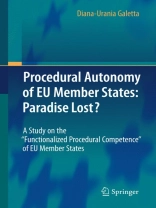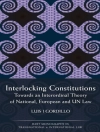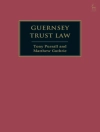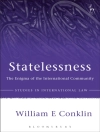Is the procedural autonomy of EU Member State a myth or a reality? What should this concept be taken to mean? Starting from the analysis of requirements and principles regulating, generally speaking, the relationships between Member States’ and EU law, this book provides a definition of procedural autonomy able to account for the concept’s inherent limits. Out of an analysis of the more relevant EU jurisprudence, the author identifies the rationale underlying the interventions of the ECJ on issues of procedural autonomy and the common logic that emerges from it; and reveals how, in an unchanged context of ‘procedural autonomy’ of the Member States, national procedural law becomes more and more ‘functionalized’ to the requirements of effectiveness of substantive EU law. As such, we should speak of a ‘functionalized procedural competence’ rather than of procedural autonomy. But this is by no means a case of “Paradise Lost.” The book includes a foreword by Prof. Jürgen Schwarze, one of the founding fathers of European Administrative Law.
Зміст
Introductory Notes, Terminological Issues and Demarcation of the Scope of the Study.- The Procedural Autonomy of the Member States from the Viewpoint of the Principles and Criteria Regulating the Relations Between National Law and EU Law.- The Jurisprudence of the ECJ on the Procedural Autonomy of Member States: Analysis of the Fundamental Judgements.- The Procedural Autonomy of the Member States: Judges and Legislators. Conclusions.
Про автора
Diana-Urania Galetta is a Full Professor of Administrative Law and European Administrative Law at the University of Milan (Italy). She studied Law and Political Science at the Universities of Milan (Italy) and Osnabrück (Germany). She speaks fluently and publishes in Italian, German, French and English. She has published books and papers on central topics of national, comparative and European Administrative Law (See her personal homepage: http://www.giuripol.unimi.it/persone/galetta.htm).












